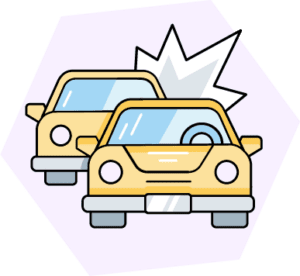Non-owner car insurance is an insurance policy that covers you if you are driving someone else’s vehicle and cause injuries or damages in an accident.
If you do not own a vehicle but drive other people’s cars regularly, a non-owner car insurance policy may be right for you. This policy does not cover damages you cause to the vehicle you are driving or injuries to yourself. Knowing exactly how this policy works will help you decide if you need non-owner car insurance and what to expect when purchasing a policy.
Table of Contents
How Does Non-Owner Car Insurance Work?
A non-owner car insurance policy provides coverage for drivers who do not own the car they are driving. It works similarly to the liability portion of an auto insurance policy. It covers damages or injuries you may cause in an accident to another vehicle or individuals. The policy does not cover damages you cause to the car you are driving or your injuries.
For example, say you have a non-owner car insurance policy and are driving your friend’s vehicle. If you wreck and cause damages to another vehicle and the car you are driving, the non-owner car policy will cover the other vehicle’s damages but will not cover damages to the car that you are driving.
In some instances, you can add medical payments or uninsured motorist coverage to your non-owner insurance policy.
- Medical payments: This covers your expenses for medical care if you are injured in an auto accident.
- Uninsured motorists: This coverage pays for your medical expenses if someone without insurance causes injuries and medical expenses.
These are optional coverages and are not offered in every state or by every insurance company.
Eligibility
To be eligible for a non-owner car insurance policy, you must have a valid driver’s license, and you cannot own a vehicle. Insurance companies will also look at the following factors:
- Your driving and insurance history
- Your age, gender, and marital status
- Where you live
- Your driving frequency
All of these factors can influence your eligibility and your premium costs.
Coverage

Non-owner car insurance is liability coverage to cover damages and injuries that you cause while driving a vehicle that you do not own. This policy will cover you for the following if you are in an accident:
- Damages to other vehicles (excluding the one that you are driving) that you cause
- Injuries you cause to other drivers and their passengers
- Injuries you cause to pedestrians
- Damages you cause to property, such as a guard rail or building
- Injuries to your passengers
What Is Not Covered?
While a non-owner insurance policy can often be a responsible idea, not everything is covered on the policy. The following are examples of what is not covered:
- Damages to the vehicle that you are driving
- Your injuries (unless you have medical payment coverage)
- Comprehensive coverage
- Collision coverage
- Rental car insurance
How Much Does Non-Owner Car Insurance Cost?
A non-owner insurance policy costs an average of $350 per year, which is usually less than a traditional auto insurance policy. This is because this policy only offers a portion of the coverage as a conventional auto policy.
Many factors go into your policy rate, including:
- Personal information, including age, gender, and marital status
- Location
- Driving history, including claims and tickets
- Frequency of driving
- Coverages selected
Should You Get Non-Owner Car Insurance?
- Affordable
- Flexible
- Meets requirements
- Provides continuous coverage
- Limited coverage
- Cannot be extended to other people
- Cannot be used for business use
- No coverage for owned cars
A non-owner car insurance policy is not the right fit for everyone. There are certain situations where you should consider getting this type of policy.
Consider Getting Non-Owner Car Insurance If…
You may consider purchasing a non-owner policy if you do not own a car and find yourself in the following situations:
- You frequently drive other people’s vehicles
- You frequently rent automobiles
- You take part in a car-sharing service
- You are in between vehicles and need temporary insurance
Advantages
A non-owner car policy has many advantages, such as:
- Affordability: These policies are generally affordable, costing on average $29 a month.
- Flexible: Non-owner car insurance offers temporary coverage when needed.
- Meets requirements: This policy meets minimum liability requirements.
- Provides continuous coverage: Provides continuous coverage if you are in between vehicles
Disadvantages
Although a non-owner policy has many advantages, there are some drawbacks to these policies as well. Some disadvantages include:
- Limited coverage: This policy only provides liability coverage and does not offer the same coverage as traditional policies.
- Cannot be extended to other people: Non-owner car insurance only covers the named insured and no one else.
- Cannot be used for business use: This policy does not cover you if you’re using the vehicle for a business purpose.
- No coverage for owned cars: If you own a vehicle, this coverage will not apply to you.
How to Get Non-Owner Car Insurance
Once you decide if a non-owner car insurance policy is right for you, you will need to look into purchasing a policy. Follow the following steps to secure your policy:

- Select an auto insurance provider. While most major insurance companies offer non-owner car policies, not all do. Select a company that provides this type of policy and has a good reputation in the auto insurance sector.
- Get quotes. You can obtain multiple quotes online or by calling the insurance provider. Make sure you are getting an apple-to-apple quote by comparing similar coverages.
- Select a policy. Once you compare your quotes, choose the one that best meets your needs. Remember that price, coverage, and the insurance company should all play a role in your decision.
- Purchase the policy. You must provide information to the company to complete the application and purchase the policy. You can do this online, over the phone, or at a local insurance office.
- Watch for documentation. After you purchase your policy, you will receive documentation in the mail. Be sure to review your policy carefully.
Putting It All Together
A non-owner insurance policy may not be right for everyone. This policy may be a great fit if you do not own a vehicle but frequently drive other cars. This policy will provide liability coverage if you injure someone or cause damages to their car or property. It is a way to protect yourself if you do not have a vehicle but still need driving coverage.
Knowing how the policy works, when it is best to purchase one, and how to secure the policy will allow you to make the process of acquiring a non-owner insurance policy easier.
